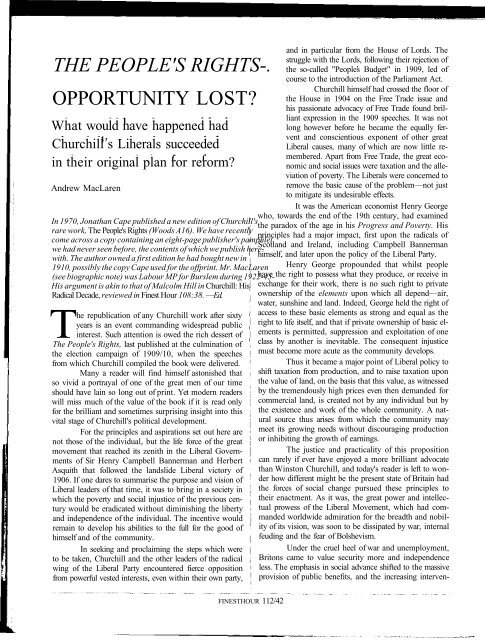What kind of a People do they think we are? - Winston Churchill
What kind of a People do they think we are? - Winston Churchill
What kind of a People do they think we are? - Winston Churchill
- No tags were found...
Create successful ePaper yourself
Turn your PDF publications into a flip-book with our unique Google optimized e-Paper software.
THE PEOPLE'S RIGHTS-.OPPORTUNITY LOST?<strong>What</strong> would nave happened had<strong>Churchill</strong> s Liherals succeededin their original plan ror rerorm?Andrew MacL<strong>are</strong>nwho, towards the end <strong>of</strong> the 19th century, had examinedIn 1970, Jonathan Cape published a new edition <strong>of</strong> <strong>Churchill</strong>'sthe para<strong>do</strong>x <strong>of</strong> the age in his Progress and Poverty. Hisr<strong>are</strong> work, The <strong>People</strong>'s Rights (Woods A16). We have recentlyprinciples had a major impact, first upon the radicals <strong>of</strong>come across a copy containing an eight-page publisher's pamphletScotland and Ireland, including Campbell Bannerman<strong>we</strong> had never seen before, the contents <strong>of</strong> which <strong>we</strong> publish herewith.The author owned a first edition he had bought new inhimself, and later upon the policy <strong>of</strong> the Liberal Party.1910, possibly the copy Cape used for the <strong>of</strong>fprint. Mr. MacL<strong>are</strong>n Henry George propounded that whilst people(see biographic note) was Labour MP for Burslem during 1922-45- have the right to possess what <strong>they</strong> produce, or receive inHis argument is akin to that <strong>of</strong> Malcolm Hill in <strong>Churchill</strong>: HisRadical Decade, revie<strong>we</strong>d in Finest Hour 108:38. —Ed.The republication <strong>of</strong> any <strong>Churchill</strong> work after sixtyyears is an event commanding widespread publicinterest. Such attention is o<strong>we</strong>d the rich dessert <strong>of</strong>The <strong>People</strong>'s Rights, last published at the culmination <strong>of</strong>the election campaign <strong>of</strong> 1909/10, when the speechesfrom which <strong>Churchill</strong> compiled the book <strong>we</strong>re delivered.Many a reader will find himself astonished thatso vivid a portrayal <strong>of</strong> one <strong>of</strong> the great men <strong>of</strong> our timeshould have lain so long out <strong>of</strong> print. Yet modern readerswill miss much <strong>of</strong> the value <strong>of</strong> the book if it is read onlyfor the brilliant and sometimes surprising insight into thisvital stage <strong>of</strong> <strong>Churchill</strong>'s political development.For the principles and aspirations set out here <strong>are</strong>not those <strong>of</strong> the individual, but the life force <strong>of</strong> the greatmovement that reached its zenith in the Liberal Governments<strong>of</strong> Sir Henry Campbell Bannerman and HerbertAsquith that follo<strong>we</strong>d the landslide Liberal victory <strong>of</strong>1906. If one d<strong>are</strong>s to summarise the purpose and vision <strong>of</strong>Liberal leaders <strong>of</strong> that time, it was to bring in a society inwhich the poverty and social injustice <strong>of</strong> the previous centurywould be eradicated without diminishing the libertyand independence <strong>of</strong> the individual. The incentive wouldremain to develop his abilities to the full for the good <strong>of</strong>himself and <strong>of</strong> the community.In seeking and proclaiming the steps which <strong>we</strong>reto be taken, <strong>Churchill</strong> and the other leaders <strong>of</strong> the radicalwing <strong>of</strong> the Liberal Party encountered fierce oppositionfrom po<strong>we</strong>rful vested interests, even within their own party,and in particular from the House <strong>of</strong> Lords. Thestruggle with the Lords, following their rejection <strong>of</strong>the so-called "<strong>People</strong>s Budget" in 1909, led <strong>of</strong>course to the introduction <strong>of</strong> the Parliament Act.<strong>Churchill</strong> himself had crossed the floor <strong>of</strong>the House in 1904 on the Free Trade issue andhis passionate advocacy <strong>of</strong> Free Trade found brilliantexpression in the 1909 speeches. It was notlong ho<strong>we</strong>ver before he became the equally ferventand conscientious exponent <strong>of</strong> other greatLiberal causes, many <strong>of</strong> which <strong>are</strong> now little remembered.Apart from Free Trade, the great economicand social issues <strong>we</strong>re taxation and the alleviation<strong>of</strong> poverty. The Liberals <strong>we</strong>re concerned toremove the basic cause <strong>of</strong> the problem—not justto mitigate its undesirable effects.It was the American economist Henry Georgeexchange for their work, there is no such right to privateownership <strong>of</strong> the elements upon which all depend—air,water, sunshine and land. Indeed, George held the right <strong>of</strong>access to these basic elements as strong and equal as theright to life itself, and that if private ownership <strong>of</strong> basic elementsis permitted, suppression and exploitation <strong>of</strong> oneclass by another is inevitable. The consequent injusticemust become more acute as the community develops.Thus it became a major point <strong>of</strong> Liberal policy toshift taxation from production, and to raise taxation uponthe value <strong>of</strong> land, on the basis that this value, as witnessedby the tremen<strong>do</strong>usly high prices even then demanded forcommercial land, is created not by any individual but bythe existence and work <strong>of</strong> the whole community. A naturalsource thus arises from which the community maymeet its growing needs without discouraging productionor inhibiting the growth <strong>of</strong> earnings.The justice and practicality <strong>of</strong> this propositioncan r<strong>are</strong>ly if ever have enjoyed a more brilliant advocatethan <strong>Winston</strong> <strong>Churchill</strong>, and today's reader is left to wonderhow different might be the present state <strong>of</strong> Britain hadthe forces <strong>of</strong> social change pursued these principles totheir enactment. As it was, the great po<strong>we</strong>r and intellectualpro<strong>we</strong>ss <strong>of</strong> the Liberal Movement, which had commandedworldwide admiration for the breadth and nobility<strong>of</strong> its vision, was soon to be dissipated by war, internalfeuding and the fear <strong>of</strong> Bolshevism.Under the cruel heel <strong>of</strong> war and unemployment,Britons came to value security more and independenceless. The emphasis in social advance shifted to the massiveprovision <strong>of</strong> public benefits, and the increasing interven-FINESTHOUR 112/42

















